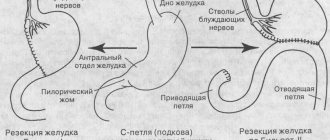Chemotherapy is the second most important method of treating stomach cancer after surgery. The use of drugs reduces the tumor before surgery, reduces the risk of relapse after surgery, and increases the life expectancy of patients with metastatic cancer. The NACFF clinic provides not only systemic, but also intra-abdominal chemotherapy, which suppresses tumor foci in the peritoneum with peritoneal carcinomatosis.
Treatment of operable stomach cancer
The best option for chemotherapy in operable patients is the perioperative use of drugs. Treatment begins before surgery. Cytostatics reduce tumor size. After this, the surgeon performs a gastrectomy (removal of the stomach) or gastrectomy, and chemotherapy is resumed.
Advantages of this approach:
- increasing the likelihood of R0 resection (complete removal of the tumor);
- increase in five-year survival rate of patients by 14%.
Adjuvant (postoperative) chemotherapy begins no earlier than one month after surgery. If the patient takes a long time to recover or complications develop, drug treatment may be started later. Chemotherapy is carried out for 6 months.
Our expert in this field:
Ivanov Anton Alexandrovich
Medical director, oncologist-surgeon, candidate of medical
sciences Call the doctor
Call the doctor
What are the advantages of HIPEC?
- Due to local effects, higher doses of antitumor drugs can be used. Only a small amount of the drug enters the systemic circulation, thereby reducing the risk of side effects.
- High temperature itself destroys tumor cells due to denaturation (changes in the three-dimensional structure) of proteins and other molecules, disruption of DNA synthesis and repair, and important biochemical processes in cells.
- Heating improves the penetration of the drug into tumor sites.
- The solution in the abdominal cavity flushes out loose tumor cells and blood clots on which they may be attached.
- Inside tumor foci, cells can be in a state of hypoxia - oxygen starvation. They are insensitive to radiation therapy but sensitive to heat.
- High temperature causes tumor cells to actively multiply, due to this, chemotherapy drugs work better on them.
- There is some evidence that heat inhibits the growth of new blood vessels in tumor lesions and stimulates antitumor immunity through the production of heat shock proteins.
The effectiveness of the HIPEC method has been proven in many large studies. For example, in January 2021, the New England Journal of Medicine published the results of hyperthermic intraperitoneal chemotherapy for peritoneal carcinomatosis caused by ovarian cancer. Patients treated with HIPEC lived on average a year longer than those treated with standard methods. However, the risk of severe side effects was extremely low.
Before the advent of HIPEC, the average survival rate for patients with peritoneal mesothelioma was 6 months. In 2021, the results of the study were published in the scientific journal International Journal of Hyperthermia. The authors of the study evaluated the use of hyperthermic intraperitoneal chemotherapy in 76 patients with mesothelioma. The median disease-free survival was almost 5 years, and the median overall survival was more than 8 years.
Treatment of disseminated stomach cancer
In case of distant metastases, radical surgical operations are not performed. Drug treatment becomes the mainstay. It can increase the patient's life expectancy, prevent complications and reduce cancer symptoms.
Patients are prescribed a combination of several drugs. The NACFF clinic uses different schemes that are selected individually. Some provide better survival, others have less toxicity and are suitable for older or disease-debilitated patients.
For metastatic stomach cancer, chemotherapy lasts 18 weeks. It includes 6-8 cycles of three weeks or 9-12 cycles of two weeks.
Most patients respond to chemotherapy. They go into remission of the disease. Tumor foci are reduced or stabilized. Once all cycles are completed, chemotherapy is stopped. The patient is being monitored. He undergoes periodic examinations to identify signs of disease progression.
Once the cancer begins to progress, chemotherapy is repeated. If more than 3 months have passed before progression, the same treatment regimen is used that gave good results the first time. If progression occurs during chemotherapy or less than 3 months after its completion, other drugs are used (second-line treatment regimen).
Is HIPEC suitable for all patients with peritoneal carcinomatosis?
Hyperthermic intraperitoneal chemotherapy is a procedure that is not suitable for all patients, and not everyone can tolerate it. To carry out this type of treatment, certain conditions must be met:
- The patient's age and comorbidities should not pose high risks during surgery. The patient must undergo a thorough and comprehensive preoperative examination.
- All tumor lesions must be resectable, that is, they can, in principle, be removed.
- The spread of cancer should be limited to the abdominal cavity only. If there are distant metastases in other organs, for example, in the brain, bones, then treatment will be ineffective.
- The entire peritoneum should not be covered with lesions larger than 2.5 cm.
Indications and contraindications for HIPEC are determined in each case individually. If you want to find out whether this treatment method is suitable for your case, make an appointment with a doctor at the Medicine 24/7 clinic.
In order to understand how effective the treatment will be, doctors determine the peritoneal cancer index (PCI). To do this, the abdominal cavity is divided into 13 areas and the size of the tumor nodes in them is assessed on a three-point scale:
- 0 points – no lesions detected;
- 1 point – lesions up to 0.5 cm;
- 2 points – lesions up to 5 cm;
- 3 points – lesions larger than 5 cm.
The division of the abdominal cavity into regions is as follows:
Intraperitoneal chemotherapy
For peritoneal carcinomatosis, which develops in the terminal stage of gastric cancer, intraperitoneal chemotherapy is given in addition to systemic chemotherapy. This is a local type of treatment that involves the introduction of a solution of chemotherapy drugs into the abdominal cavity.
Without special treatment, peritoneal carcinomatosis leads to the death of the patient within 3-5 months. With systemic chemotherapy, life expectancy increases to 7-9 months. If it is combined with intraperitoneal chemotherapy, the patient can live several more years if there is a good response to treatment.
Hyperthermic intraperitoneal chemotherapy for gastric cancer
In addition to classical and targeted treatment, Oncology doctors also use an innovative technology called hyperthermic intraperitoneal chemotherapy, or HIPEC. The indication for its use is the presence of metastases on the peritoneum - the inner lining of the abdominal cavity. In gastric cancer, the peritoneum is one of the main areas of distribution of secondary foci.
Hyperthermic intraperitoneal chemotherapy is carried out not before or after, but directly during surgery to remove the main tumor nodes. The essence of HIPEC is to create direct contact between the chemotherapy drug and malignantly degenerated cells in the peritoneum. To do this, after excision of visible cancerous foci, the patient’s abdominal cavity is filled with a cytostatic solution. Then he will remain in it for the next hour and a half. Moreover, this solution is preheated to 41-42 0C.
Chemotherapy for gastric cancer using the HIPEC technique has a number of advantages compared to traditional infusion administration of drugs:
- The drug directly affects metastases located on the peritoneum, distributing as evenly as possible.
- Local use without prior circulation of drugs in the blood significantly reduces the severity of side effects.
The increased temperature allows the cytostatic solution to penetrate deep into the tissues and destroy even single cancer cells in the thickness of the peritoneum.
Where to go
For chemotherapy for stomach cancer, contact the NACFF clinic. Our advantages:
- Individual selection of a treatment regimen, depending on the stage of cancer, response to therapy, and the patient’s health condition.
- Supportive treatment to minimize the risk of complications and eliminate side effects.
- Combination of chemotherapy with other methods of drug treatment for metastatic cancer: immune, targeted therapy.
- Not only systemic, but also local (intraperitoneal) chemotherapy is available, which increases life expectancy and eliminates ascites.
To make an appointment with an oncologist and undergo chemotherapy at the NACFF clinic, call or request a call back.,
Send documents by email The possibility of treatment will be considered by the chief physician of the clinic Anton Aleksandrovich Ivanov, oncologist-surgeon, kmn
Treatment regimens
The chemotherapy treatment plan is drawn up by the attending physician, taking into account the individual characteristics of the disease and the patient.
One of the standard regimens in the early stages of stomach cancer is 3 cycles of chemotherapy before surgery and 3 cycles after surgery. Each cycle lasts 3 weeks. The most commonly used modes are:
- ECF (Epirubicin, Cisplatin and Fluorouracil);
- ECX (Epirubicin, Cisplatin and Capecitabine).
The duration of chemotherapy for late-stage gastric cancer is determined individually. The above combinations of drugs, as well as other regimens, can be used:
- EOF (Epirubicin, Oxaliplatin and Fluorouracil);
- EOX (Epirubicin, Oxaliplatin and Capecitabine).
Also, in the later stages of stomach cancer, they are trying to use new drugs, such as Erbitux (cetuximab), Innotecan and others.
The interval between preliminary chemotherapy treatment and surgery is usually 5-6 weeks. During gastric resection, chemotherapy after surgery is carried out no earlier than 6-10 weeks; the treatment regimen is determined depending on the diagnosis and condition of the patient.
To monitor the effectiveness of therapy and reduce the risk of complications, patients are under constant medical supervision.
In 2021, a number of clinical trials were conducted in the Russian Federation to study new approaches to chemotherapy for stomach cancer, including
- Comparison of combination treatment with nivolumab and ipilimumab in patients with advanced or metastatic gastric cancer, as well as gastroesophageal junction cancer with the combination of oxaliplatin/fluoropyrimidine - in Vitamed LLC, Moscow. Ch. researcher – Poddubskaya E.V. The trials included volunteers with HER2-negative status who had not previously received chemotherapy or had been treated no later than 6 months before the start of the study.
- Evaluation of the effectiveness and safety of neoadjuvant chemotherapy (SD 46 Gy CAPOX) followed by removal of the stomach (D2 gastrectomy) and adjuvant chemotherapy (CAPOX/FOLFOX) in patients with locally advanced GC - at the MRRC named after. A.F. Tsyba, Tomsk National Research Medical Center RAS, Chuvash Clinical Oncology Center. Ch. researcher – Skoropad V.Yu.
What happens after HIPEC?
Treatment results vary depending on the type of malignant tumor, the number and size of lesions in the abdominal cavity, and other factors. For example, pseudomyxoma has a better prognosis than colorectal cancer and malignant mesothelioma.
HIPEC could potentially destroy all tumor cells and completely cure the patient. However, even if a cure cannot be achieved, life expectancy increases significantly: it is years instead of months.
Previously, in order to undergo HIPEC, patients from Russia were forced to go to foreign clinics. Now this technique is available in Moscow. At the Medicine 24/7 clinic, the procedure is performed by experienced oncologist surgeons and chemotherapists who have been trained in leading oncology centers abroad. Contact us and get advice from our specialist doctor.
We will call you back
Leave your phone number











